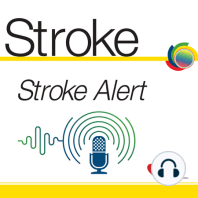38 min listen
Stroke Alert August 2021
FromStroke Alert
ratings:
Length:
27 minutes
Released:
Aug 19, 2021
Format:
Podcast episode
Description
On Episode 7 of the Stroke Alert Podcast, host Dr. Negar Asdaghi highlights two articles from the August 2021 issue of Stroke: “Stroke Risks in Adult Survivors of Preterm Birth: National Cohort and Cosibling Study” and “Roles of Phytoestrogen in the Pathophysiology of Intracranial Aneurysm.” She also interviews Drs. Nirav Bhatt and Diogo Haussen about their article “Reliability of Field Assessment Stroke Triage for Emergency Destination Scale Use by Paramedics: Mobile Stroke Unit First-Year Experience.” Dr. Negar Asdaghi: 1) Can preterm birth be associated with increased risk of stroke in adulthood? 2) Can a plant-based diet high in phytoestrogens reduce the risk of aneurysm formation and aneurysmal rupture in postmenopausal women? 3) What is the predictive ability of FAST-ED score in detection of large vessel occlusion? We will review these questions in today's podcast. You're listening to the Stroke Alert Podcast. Stay with us. Dr. Negar Asdaghi: From the Editorial Board of Stroke, welcome to the Stroke Alert Podcast. My name is Negar Asdaghi. I'm an Associate Professor of Neurology at the University of Miami Miller School of Medicine and your host for the monthly Stroke Alert Podcast. The August 2021 issue of Stroke covers a wide range of topics from examining if the presence of spot sign modifies the treatment effect of tranexamic acid in patients with intracerebral hemorrhage to the results of the PRESERVE randomized clinical trial examining whether intensive blood pressure lowering in patients with severe cerebral small vessel disease can be associated with progression of white matter damage as detected by diffusion tensor imaging or MRI studies, which I encourage you to review in addition to our podcast today. Dr. Negar Asdaghi: Later in today's podcast, I have the pleasure of interviewing Drs. Diogo Haussen and Nirav Bhatt from Emory University on their work on reliability of FAST-ED scale when used by the paramedics in mobile stroke units and learn about the implementation of mobile stroke units in Atlanta. But first with these two articles. Dr. Negar Asdaghi: Preterm birth, defined as birth prior to 37 weeks of gestation, affects approximately 11% of births worldwide. Today, with the advent of modern neonatal and pediatric care, the majority of preterm babies survive into adulthood. Multiple studies have shown that adult survivors of preterm birth are at increased risk of developing vascular risk factors, such as diabetes and hypertension, and have a higher incidence of ischemic heart disease as compared to their age-matched individuals born at term, though the association between preterm birth and risk of stroke is not well studied. Dr. Negar Asdaghi: In the current issue of the journal, Dr. Casey Crump from Departments of Family Medicine and Community Health and Population Health Science and Policy at Icahn School of Medicine, Mount Sinai, New York, examined whether preterm birth is associated with an increased risk of stroke and its major subtypes in adulthood. The authors use the prenatal and birth information obtained from the Swedish Birth Register, which contains information for nearly all births in Sweden since 1973. The study cohort included over 2,200,000 singleton live births in Sweden from 1973 to 1994. These years were chosen to allow for sufficient follow-up into adulthood. The study cohort was examined for the earliest diagnosis of stroke from the time the participants turned 18 through September 31, 2015, and the maximum age of included population is 43 years. Stroke was identified using ICD codes from all primary and secondary diagnosis in the Swedish Hospital and Outpatient Registries and all deaths attributed to stroke in the Swedish Death Register. Dr. Negar Asdaghi: Cosibling analyses assess for potential shared, familial confounding factors, such as genetic and environmental factors, that could contribute to development of stroke. In 28 million person-yea
Released:
Aug 19, 2021
Format:
Podcast episode
Titles in the series (39)
Stroke Alert July 2021: Monthly summary & analysis of selected research published in the Stroke journal by Stroke Alert
